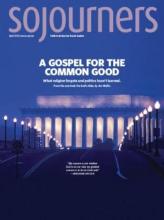IN THE EARLY weeks of the Eastertide lectionary, there appears a series of texts from the third and fourth chapters of Acts ... Peter and John, on their way to temple prayers, heal a man begging at the beautiful gate. His joy begets a sermon from Peter on the resurrection, at the close of which the disciples are arrested and spend the night in jail. The next day in court they again testify boldly, refuse to comply with the court's order, and are released after calculated threats from the authorities. Their release prompts prayers of thanksgiving in the community.
Read the Full Article

Already a subscriber? Login
